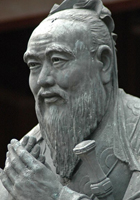An Entreaty Poem by Confucius
An Entreaty
Along the great highway,
I hold you by the cuff.
O spurn me not, I pray,
Nor break old friendship off.
Along the highway worn,
I hold your hand in mine.
Do not as vile me scorn;
Your love I can't
The full text of the poem should read as I have pasted it below. I think everyone who reads this should use the link provided near the bottom to report this aborted half-birth and have the full text replace it. An Entreaty Along the great highway, I hold you by the cuff. O spurn me not, I pray, Nor break old friendship off. Along the highway worn, I hold your hand in mine. Do not as vile me scorn; Your love I can't resign.
It does make more sense as Lantz Pierre points out below concerning the entire poem not being printed.
Confucius, a philosopher of the Spring and Autumn period of Chinese history, developed a system called Confucianism. His mystics were viewed against the religious practices existing in his own times, but the ecstasies were related to the trance of the shamans who had healing and psychic transformation powers. There is a line between Daoism and Confucianism. These two systems have many common ideas about man, society, the ruler, heaven, and the universe. Behind Daoism stands Laozi, the author of the Daodejing (“Classic of the Way of Power”) . The first mention of Laozi is found in the Zhuangzi (4th–3rd century BCE) . Laozi was one of Zhuangzi’s teachers. The Zhuangzi presents seven versions of a meeting of Laozi and Confucius. Laozi is portrayed as an old man teaching Daoism his friend. Laozi was a senior contemporary of Confucius (6th–5th-century BCE) . A biography of Laozi is found in the “Records of the Historian” (Shiji) —China’s first universal history (2nd-century BCE) —of Sima Qian. Laozi was an archivist at the Zhou court. He instructed Confucius on points of ceremony. Observing the decline of the Zhou dynasty, Laozi left the court and headed west. At the request of Yin Xi, he wrote his treatise on the Dao in two scrolls. Then, he left China. The universe has its Dao or Way; there is a Dao of the sovereign while the Dao of man comprises continuity through procreation. In the Daodejing, the ultimate unity of the universal Dao itself becomes a social ideal. This idealistic peculiarity seems to justify the term Daoist to the Daodejing and its successors. Nothing (wu) and Dao are not identical; “in its mode of being Unseen, we will see its mysteries; in the mode of the Seen, we will see its boundaries.” In the poem, Confucius' friend is Laozi and the way is Dao. The ideal is reached through prayers and sacrifice.Wonderful poem. Voted 10.
Torn between love, friendship and longing, calls emotion into effective play.

Great work... thanks for posting....